Azerbaijan only reliable all-weather road for Armenia amid approaching troubles via Georgia's Verkniy Lars
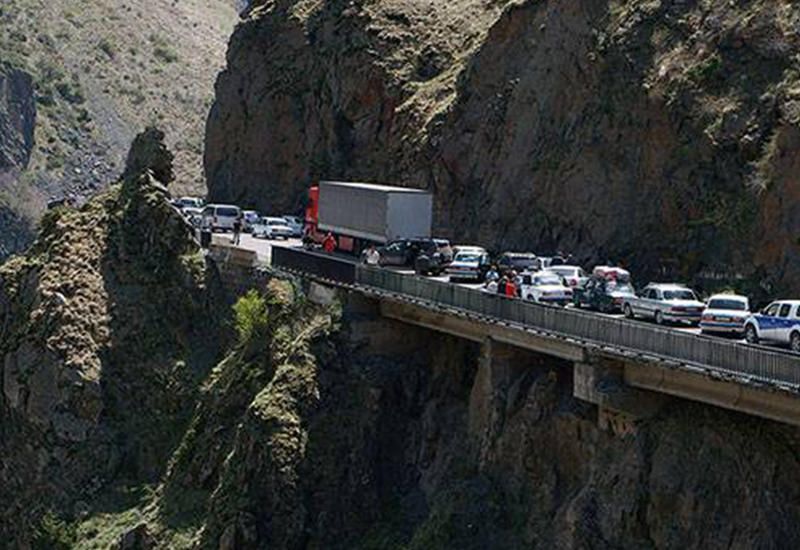
Winter is coming. This phrase, which has become common after the release of the first episode of the Game of Thrones, is used when one wants to talk about approaching serious and imminent problems.
Winter is really coming: September is almost over, and by the end of October, frost will already cover the mountains of the Greater Caucasus, and abandon these areas only in May. And this is a big problem for countries, like Armenia, which, through its own fault, have no access to the big world and are completely dependent on the season and the weather forecast.
The Verkniy Lars (Jvari Pass) checkpoint on the Georgian-Russian border is the only route for Armenia, its cargo, and vehicles. It has no other roads. The borders with Turkiye and Azerbaijan are still closed; the border with Iran is meaningless in terms of international trade, because Armenia's main trading partner, which accounts for almost 33 percent of its foreign trade, is Russia. By comparison, Iran accounts for only 6 percent.
For almost nine months of the year, the Verkniy Lars checkpoint is the focus of news reports, due to alarming reports of drifts, rockslides, avalanches, and the resultant kilometers-long traffic jams on the approaches to the border. This time it hit the headlines much earlier.
For several days now, endless queues of private cars, not trucks, as usual, have lined up at Verkniy Lars. Because of the mobilization in Russia, Russian citizens are trying to leave for neighboring countries, including Georgia. Of course, this is not Armenia's problem, but the resulting traffic jam has completely slowed down the transit of freight trucks moving from Armenia to Russia and vice versa. So far, it's not snowstorms that are to blame for, but there is not much time left before the weather breaks out, and Armenia has almost no time to think about it.
And there is a lot to think about. It's been two years since Armenia was given the opportunity not to depend on the weather and to establish normal transport links with its main trade partner by a convenient, reliable, and year-round open route - through Azerbaijan. The results of the 44-day war and the goodwill of Baku gave Yerevan such an opportunity. But Armenia did not use it. Today, hoping that at least half of those passing through the Jvari Pass will then rush to Armenia, the Armenian media are trying to look for some advantages in what is happening. They say that money from Russians will flow to Armenia, finally, there will be someone to work, and so on. At the same time, everyone is trying not to mention that these frivolous forecasts are unable to drown out other, very alarming signals concerning the real economy.
There is no need to even wait for winter. In June 2022, Verkniy Lars was closed for a long time because of a road collapse. During that time, the Armenian agricultural products waiting to be exported to Russia spoiled. The same thing is happening now. There are no avalanches and mudflows, but the trucks with so-called gifts of the Armenian land stand in queues for days, losing the quality of goods. What can be the advantages of all this? It is not clear.
It should be emphasized that Russia and Georgia, which also use this checkpoint, don’t have such problems, because both countries have alternatives in the form of roads and railroads of Azerbaijan. In case of problems at Lars, Georgian and Russian cargoes are redirected to the Azerbaijani route. Yes, it is much longer than the road through the Jvari Pass, but considering the weeks of delays and freezing in queues, that thousand kilometers turn into nothing.
During the Georgian roadblock in June, there was a 100-kilometer-long queue and trucks started to be stopped by police long before Stepantsminda and placed in special parking lots for further queuing. Many had to stand in the parking lots for up to two weeks. It was no accident that the Belarusian embassy in Georgia advised Belarusian carriers in those days to take the road through Azerbaijan.
The problem of Verkniy Lars is not just a weather-related problem. It is equally a political problem. Serious problems with regional transit emerged after the beginning of the Karabakh conflict. The events of 2008 in Georgia further aggravated the situation, as Georgia closed communication through the separatist regions. And this is a big loss because the railroad runs through Abkhazia. Over the past few years, Yerevan and Moscow have repeatedly made plans to persuade Tbilisi to open the railway through the annexed region. However, the Georgians are remaining resilient so far.
Armenia, as the most interested in Georgian transit but at the same time, the poor country, can only make projects. Its real participation in the implementation of such ideas as creating a new checkpoint, widening the road, or making a tunnel through the mountain remains zero.
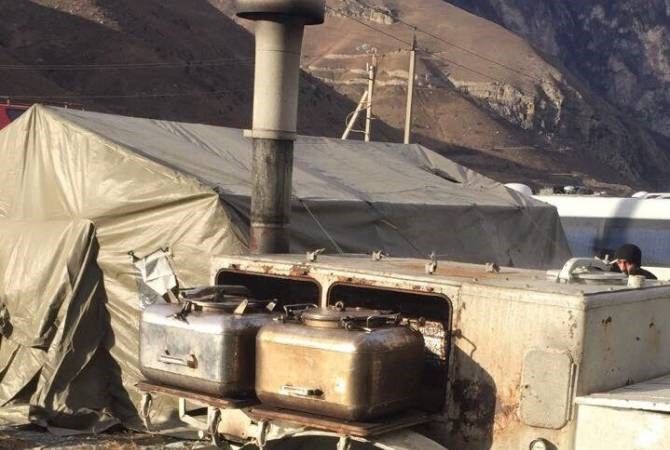
Camp kitchen and tent deployed for Armenian carriers during another emergency
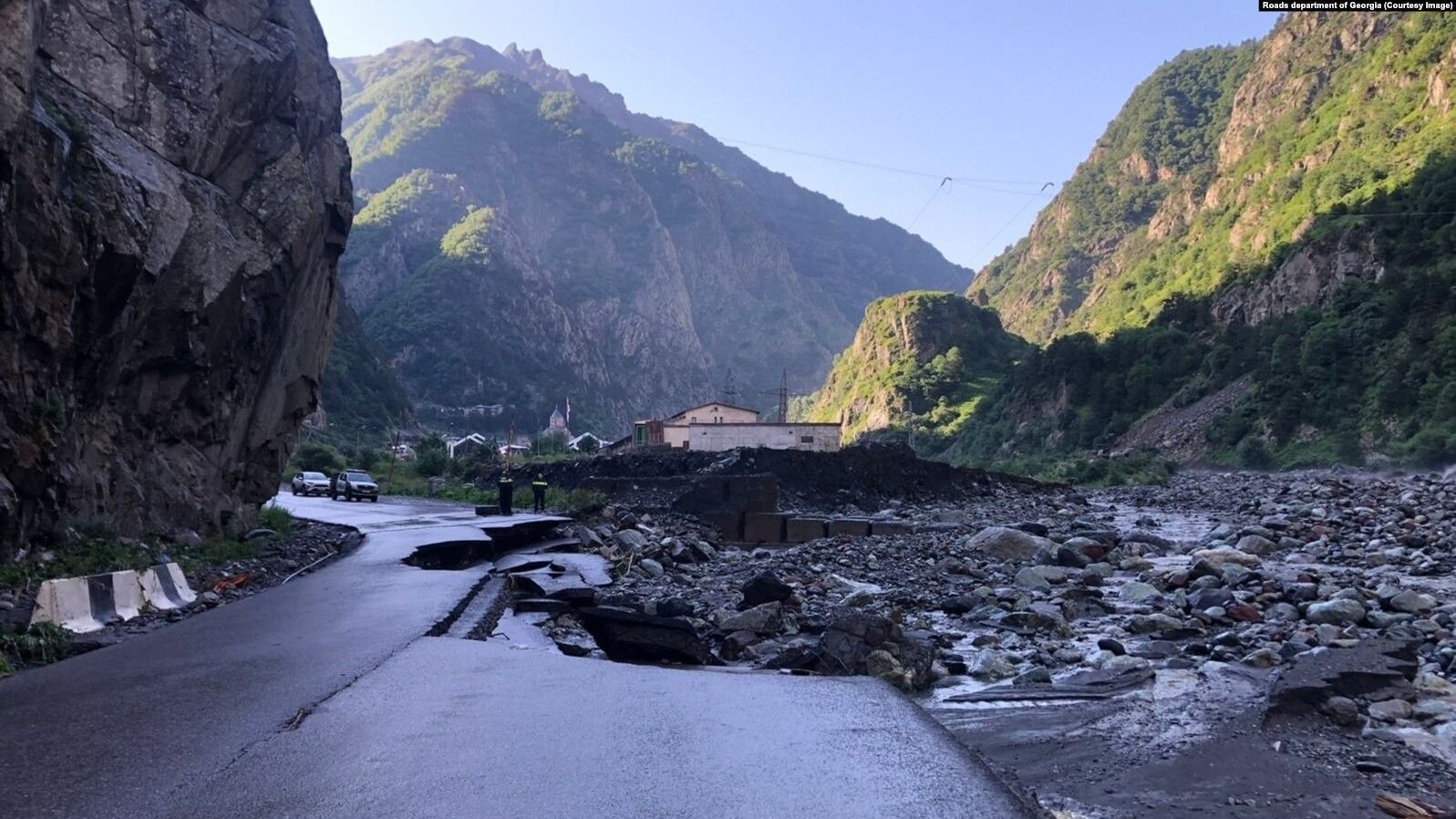
Road collapse at the Georgia-Russia border after heavy rains
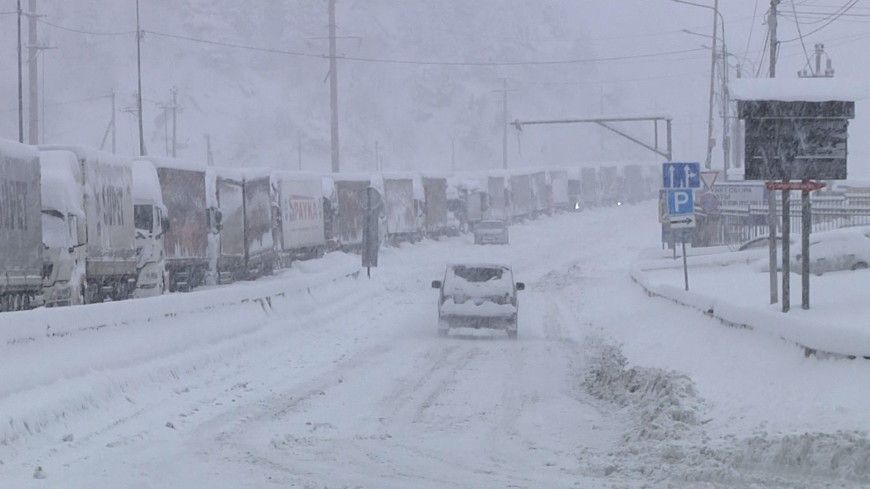
A typical view of the Georgia-Russia road in winter
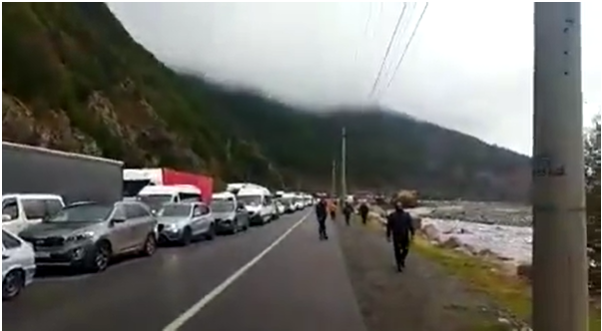
Queues of Russians at the Russian-Georgian border
Georgia plans to complete the most difficult and dangerous section of the Mtskheta-Stepantsminda-Lars road in 2024. The road was planned to be completed in 2022, but due to the coronavirus pandemic, the deadline was postponed. The 22.7-km road, including the 10-km tunnel under the Jvari Pass, is scheduled to be completed in two years. We wish success to our Georgian neighbor in completing the project, but we would like to warn the Armenian side that Armenia may not survive another two years of isolation. Its problems could be solved much faster if its leaders and politicians were as smart and as much in favor of the Armenian people as they claim they are.
Several years ago, Armenia considered another option for bypassing Lars - via the Black Sea. It came to some “clever” minds that Armenians could export their apricots by ferry from Poti, Georgia, to Russian Black Sea ports. In this case, the threat of avalanches and rockslides was eliminated, but it turned out that ferry freight would be much more expensive than overland transportation. Nevertheless, Armenia decided to launch this project in spite of its obligations to open communications in accordance with the trilateral statement of November 10. Negotiations with Dutch company APM Terminals Poti were launched and the first ferry with the Armenian cargo was supposed to leave in mid-June, but the Armenians weren't lucky again. The Dutch imposed sanctions against Russia because of Ukraine. How long do the Armenian apricots have to wait now? It looks like the project is stalled for an indefinite period.
Thus, as of the end of September, there had been no progress in Armenia's search for an alternative to Verkniy Lars. This is probably because the Armenians are not looking for it in right place.
Once again, as it has been for the past two years, Armenia is faced with a dilemma - to start solving the issue of the Zangezur corridor and other communications with Azerbaijan or to wait in hundred-kilometer-long lines until the snow melts, an avalanche comes down, the road is restored, or the flow of Russians to the Jvari Pass is stopped. All these options are unreliable. To repeat, the only possibility is to go for peace and agreements with Azerbaijan. Azerbaijan also has difficult passes, but the interstate roads take a convenient and safe route. Azerbaijan is a country that opens up great opportunities for its defeated and pathetic in its stubbornness neighbor, which will not even require it to spend money. It is worth remembering that Azerbaijan, having built an alternative to the Lachin road, offered to lay a section of the route into Armenian territory as well. The Armenians, of course, refused.
Let's not pretend to be altruists – Azerbaijan is interested in the opening of communications, too. However, Azerbaijan can easily manage without the Armenian transit, as it has been doing perfectly well without it all these years. The situation in Armenia dictates that it needs to stop persisting and frantically seek alternatives. It has no and will not have an alternative to stable, convenient, and cost-effective transit through Azerbaijan.
--
Follow us on Twitter @AzerNewsAz
Here we are to serve you with news right now. It does not cost much, but worth your attention.
Choose to support open, independent, quality journalism and subscribe on a monthly basis.
By subscribing to our online newspaper, you can have full digital access to all news, analysis, and much more.
You can also follow AzerNEWS on Twitter @AzerNewsAz or Facebook @AzerNewsNewspaper
Thank you!
